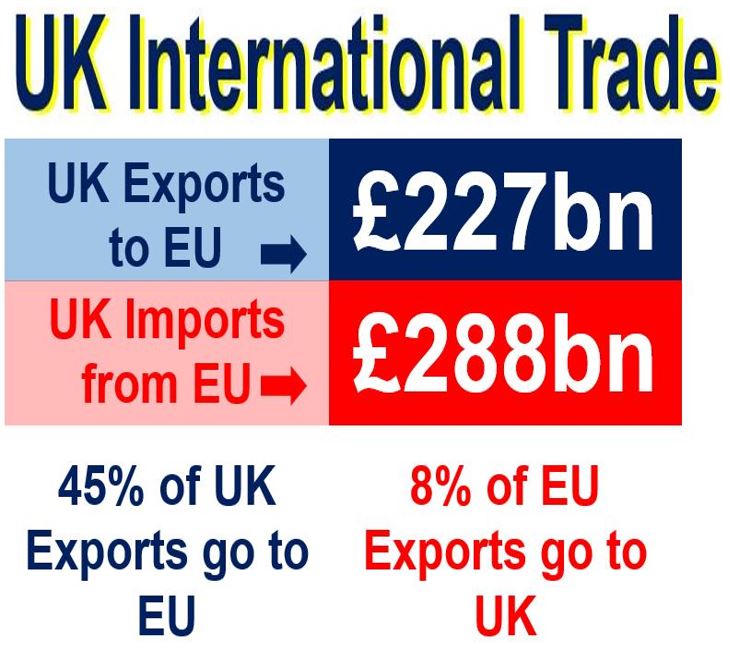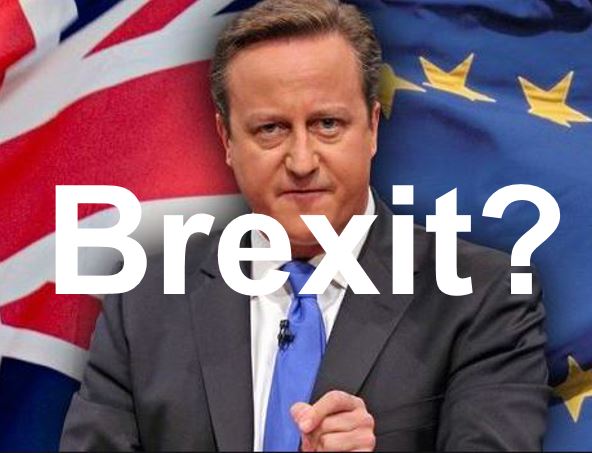The pound slid to a 3-week low as Brexit jitters start to kick in – three polls suggest support for leaving the European Union is growing, while the proportion or Remain voters appears to be faltering. Is what we are seeing now a tiny taste of what is to come if Britons choose Brexit?
Economists, financiers and business experts say what we are seeing today – a sliding pound – is nothing compared to what would immediately follow a Brexit vote. Investments from abroad would virtually dry up completely if Britons voted to leave, they say. In fact, a lot of domestic money could be moved out of the country.
On 23rd June there will be a referendum in the UK – Britons will decide whether to remain in the European Community (EU) or leave.
 The EU is a major market for British exports, the UK is a much smaller market for EU exports. Who would suffer more if no trade deal was negotiated after the UK left the EU? Most economists say the UK would suffer considerably more.
The EU is a major market for British exports, the UK is a much smaller market for EU exports. Who would suffer more if no trade deal was negotiated after the UK left the EU? Most economists say the UK would suffer considerably more.
When markets opened today in London, sterling fell to a three-week low almost immediately – declining by 0.9% to $1.43. It also fell against the euro – by 0.5% to €1.269.
More support for Brexit than Remain
A YouGov poll showed that 45% of British voters now support a Brexit from the EU, compared to 41% who say they support Remain.
Two other polls also placed the Brexiters ahead. An Observer/Opinium survey reported 43% support for Leave versus 40% for Remain, while a TNS poll reported Leave at 43% compared to Remain at 41%.
Despite overwhelming evidence presented by expert economists, the Bank of England, the CBI, the IMF and OECD, British voters are still warming to the idea of regaining their sovereignty and control over immigration – the two issues that worry Britons the most.
Every time polls suggest that voters are moving to select Leave, investors run for the hills. Last Tuesday, when an online and a telephone ICM poll showed a Leave lead of three percentage points, sterling took a beating.
 David Cameron warned today that Brexit – Britain leaving the EU – would be the equivalent of placing a bomb under our economy.
David Cameron warned today that Brexit – Britain leaving the EU – would be the equivalent of placing a bomb under our economy.
Bookies cutting Brexit odds
British bookies (betting shops) have once again reduced the odds of Britain leaving the EU to around 9/4 – quite a change from the 4/1 just two weeks ago.
In an interview with This is Money, market analyst at Oanda Craig Erlam said:
“The polls are likely to make people rather uneasy and we can see that quite clearly today in the pound, currently down almost 1 per cent against the dollar, having hit three-week lows earlier in the session.”
“With both sides likely to step up their game over the next couple of weeks, I imagine we’ll see a lot more volatility in the pound, and the closer the polls get, or if ‘Vote Leave’ continues to push ahead, the pound may find itself back towards April’s lows before too long.”
Virtually every analyst and market strategist in London forecasts further sterling losses if polls carry on indicating a Brexit lead.
Immigration fear among British voters
Until recently, focusing on the economic damage – that allegedly would occur if Britons voted to leave the EU – was working; the percentage of Remainers was ahead of Leavers every week.
However, the Leave camp’s tactic of upping the rhetoric on immigration is bearing fruit.
What the Leave campaigners leave out, of course, is that a UK outside the European Union would not really have much say on immigration. In order to secure a trade deal with the trading bloc, the UK will probably have to accept EU immigration rules.
The Leave camp’s argument that the UK calls the shots in any trade deal with the EU – because we buy more from them than they buy from us – is painfully naïve. Forty-five percent of all British exports go to the EU, but only 8% of EU exports go to the UK. In other words, a trade deal matters considerably more to Britain than it does to the EU – if no deal was struck, Britons would suffer much more than the Europeans.
The UK is a trading nation – twenty-eight percent of all the goods we produce are sold abroad. Without international trade – the importing and exporting of goods and services – we would be in serious trouble.
Add to this the psychological effect on the UK economy of a Brexit vote – general investor panic – and we have the ingredients for a major economic meltdown.
Bank of England Governor Mark Carney, and literally hundreds of other experts, warn that the value of sterling could go into total free-fall in the event of a Leave vote.
In fact, Britain is already suffering economically, probably as a result of investor Brexit jitters. The slowdown in UK industry is continuing – it has been subdued for four successive quarters.
According to a survey of nearly 350 companies, the main reasons for the slowdown were the steel crisis, cutbacks in oil & gas investment, and uncertainty regarding the EU referendum.
When British voters stand in the ballot box, during those few seconds before deciding where to place their ‘X’, will they choose sovereignty, despite the huge economic risks? Nobody knows the answer to that question. We will find out on 23rd June.
